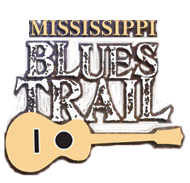Willie Dixon
Willie Dixon - Vicksburg
Willie Dixon, often called “the poet laureate of the blues,” was born in Vicksburg on July 1, 1915. As a songwriter, producer, arranger, and bass player, Dixon shaped the sound of Chicago blues in the 1950s and ’60s with songs such as “Seventh Son,” “Little Red Rooster,” “Hoochie Coochie Man,” “My Babe,” and “Wang Dang Doodle.” Dixon traced many of his works back to poems and songs he heard or wrote as a youth in Vicksburg.
Willie Dixon, born at 1631 Crawford Street, about ¾ mile east of this site, defined the blues as “the facts of life.” Dixon developed his ear for language and music in Vicksburg by listening to his mother Daisy’s poetry, singing spirituals at Spring Hill Baptist Church, and savoring the blues of pianist Little Brother Montgomery. He learned harmony singing from Theo Phelps, leader of the Union Jubilee Singers, and sang with the quintet on a weekly WQBC radio program broadcast from the Vicksburg Hotel in the 1930s. Dixon also brokered his songs to other WQBC performers. As a teenager, he often left town in search of work during the Depression, loading freight, chopping wood, or shoveling coal, among other jobs, and was once arrested for hoboing in Clarksdale, Mississippi. In 1936, he moved to Chicago and pursued a brief boxing career. But he continued to sing and write songs, and learned to play a homemade one-string bass.
Dixon recorded with the Big Three Trio and other combos before securing a production job with Chess Records in the early 1950s. He emerged as the studio mastermind behind the classic Chicago blues of Muddy Waters, Howlin’ Wolf, Sonny Boy Williamson, Little Walter, Koko Taylor, and many others. Dixon played string bass on numerous sessions, including the first hits by Chuck Berry and Bo Diddley. He also produced the debut releases of Otis Rush, Buddy Guy, and Magic Sam on the Cobra and Artistic labels.
Dixon’s impact reached far beyond the African American blues market. He played a key role inpromoting and booking blues in Europe in the 1960s, and covers of his songs by the Rolling Stones, Led Zeppelin, and others sold millions of copies. He subsequently toured and recorded several albums with his band, the Chicago Blues All Stars. His achievements earned him induction into both the Rock and Roll and Blues Halls of Fame.
In 1981, Dixon established the Blues Heaven Foundation to assist blues musicians and sponsor blues education programs. After his death in Burbank, California, on January 29, 1992, his widow, Marie, and the Dixon family carried on his mission, and in 1997 they fulfilled a Dixon dream by purchasing the former Chess Records building in Chicago to house Blues Heaven. Dixon is buried in Alsip, Illinois.
Vicksburg honored its native son by renaming this street Willie Dixon Way in 2002.
content © Mississippi Blues Commission
[ BACK TO TOP ]

